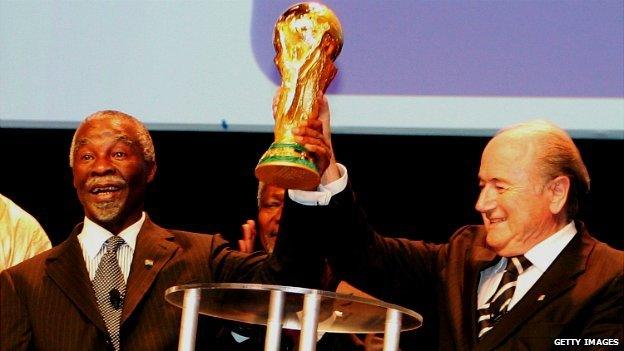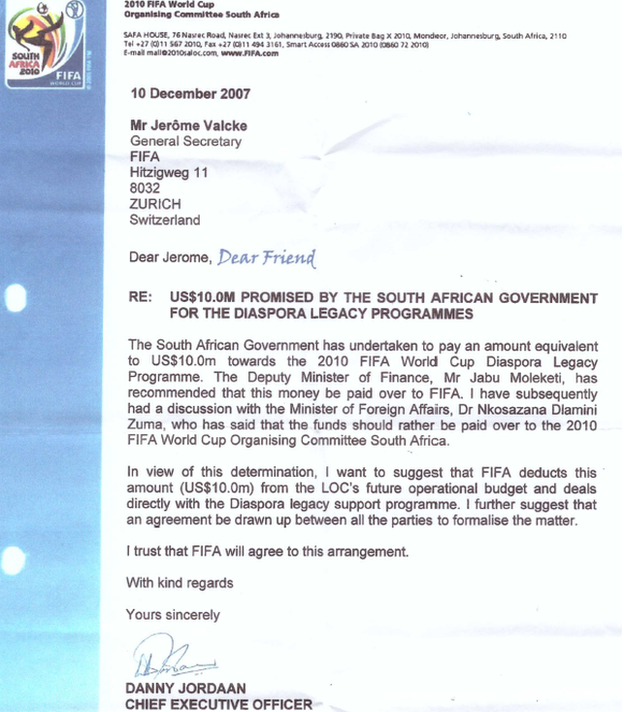Fifa crisis: 'Ex-President Mbeki approved South Africa's $10m'
- Published

Thabo Mbeki is said to have authorised a payment to Fifa that US prosecutors say was a bribe
South Africa's sports minister says the decision to donate $10m (£6.5m) to Fifa to develop Caribbean football was approved by then President Thabo Mbeki.
The payment, which South Africa denies was a bribe to secure the 2010 World Cup, is central to the Fifa scandal.
The claim comes after a letter emerged that appears to show officials seeking an indirect route for the transfer.
South Africa's government said the letter did not contradict its statement that this was a legitimate payment.
It says the cash was to fund the development of football for the African diaspora in the Caribbean and that the reporting of the letter in South Africa's Mail & Guardian, external was "regurgitation and sensation".
The letter was written by then South Africa FA head Danny Jordaan three weeks before the first amount was paid in 2007.
US prosecutors say, external the money, which is a key plank in the wide-ranging criminal inquiry that has engulfed world football's governing body, was a bribe to Fifa officials.
Seven top Fifa officials, including two vice-presidents, were arrested last week in Switzerland as they awaited Fifa's congress.
They were among 14 new indictments in the US investigation, which alleges they accepted bribes and kickbacks estimated at more than $150m over a 24-year period.
Four other people were charged earlier. One of them, ex-Fifa official Chuck Blazer, has pleaded guilty in the US to taking bribes related to South Africa's bid.

Karen Allen, BBC News, Johannesburg
Sports Minister Fikile Mbulula confirmation's that it was former President Thabo Mbeki who made the decision to donate $10m is not proof of a bribe.
The South African government maintains it was a legitimate payment. But together with the leaked letter from Danny Jordaan, it does show the lengths the government appeared to go to not to be associated with the transfer of funds and that the top man in South Africa sanctioned the payment.
All this begs the question: If it was an above-board donation to boost Caribbean football, why the accounting gymnastics?
Mr Mbeki has said in a statement that he was "not aware of anybody who solicited a bribe" in return for South Africa being awarded the right to host the 2010 World Cup.
Mr Jordaan's letter, dated three weeks before the first tranche of the $10m payment was made, sets out how the transfer was to be made - based on a promise - and honoured three years after South Africa won the right to host the tournament.
The US indictment revealed a conundrum faced by the South African government; that it was unable to arrange payment directly from government funds.

'Diaspora legacy'
On Friday, Sports Minister Fikile Mbalula told the Beeld newspaper that Mr Mbeki had authorised the payment after he "spoke with the leadership of the 2010 World Cup local organising committee".
"[It was] the government's idea," he added.
In a statement released last week when the scandal began, Mr Mbeki said: "I wish to state that the government that I had the privilege to lead would never have paid any bribe even if it were solicited."

How Fifa makes and spends its money
Why should I care about Fifa corruption scandal?
What will it take to fix Fifa?
The leaked letter, which also emerged on Friday, is signed by Mr Jordaan and addressed to Fifa secretary-general Jerome Valcke.
In the letter, Mr Jordaan says the deputy finance minister recommended the money be paid to Fifa but that Minister of Foreign Affairs Nkosazana Dlamini-Zuma said it should instead "be paid over to the 2010 Fifa World Cup Organising Committee South Africa".
Ms Dlamini-Zuma, who is President Jacob Zuma's ex-wife, is now chair of the African Union Commission.
The Mail & Guardian, external quoted former Deputy Finance Minister Jabu Moleketi as saying the letter was a "fabrication" and that he denied having "a conversation of that nature" with Mr Jordaan.
South Africa's sports ministry said in a statement on Friday that the letter merely affirmed that the payment was legitimate and proved that "the diaspora programme was pursued to support government policy".
Mr Valcke has previously denied any wrongdoing in the matter.
Nick Bryant reports on the admissions by former Fifa executive Chuck Blazer that he and others accepted bribes
US prosecutors say a senior South African official travelled to Paris to hand over cash in $10,000 stacks in a hotel room to an unnamed person working for Jack Warner, the former Fifa vice-president and head of Concacaf.
On Wednesday they released a transcript of Mr Blazer's guilty pleas, in which he said: "Beginning in or around 2004 and continuing through 2011, I and others on the Fifa executive committee agreed to accept bribes in conjunction with the selection of South Africa as the host nation for the 2010 World Cup."
In addition to the US investigation it was announced on Thursday that an elite police unit in South Africa is to launch a preliminary inquiry into allegations that officials paid bribes over the 2010 World Cup bid.

The letter was written by Danny Jordaan, who was chief of South Africa's FA at the time